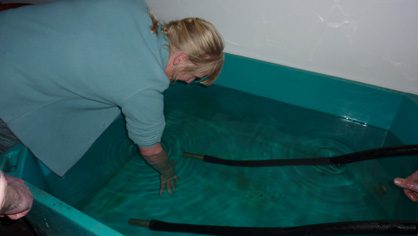21 January 2011
First discussions towards defining management measures for the Dutch sector of the Dogger Bank, the Cleaver Bank and Frisian Front were progressed at the FIMPAS workshop held in Den Helder, Holland, between 24th and 26th January.
The FIMPAS project has been running since 2009 led by the Dutch Government and ICES, and covers 3 offshore Habitats and Birds Directive Natura 2000 sites in Dutch offshore waters including the Dogger Bank, Cleaver Bank and Frisian Front.
The work forms a test bed of how measures may be developed subsequently within UK waters and this is particularly significant for the Dogger Bank where the UK is expected to formally submit the UK section of the Dogger to the European Commission as a Special Area of Conservation (SAC) this summer. The workshop concluded that it would be necessary to progress measures for the Dogger by considering also the UK and German sections in tandem. This will be progressed with the intention of holding a further workshop in the summer and with the expected close involvement of the North Sea RAC.
Dale Rodmell, NFFO Assistant Chief Executive, said: “Naturally, we had deep concerns over initial alarmist proposals brought to the meeting for blanket bans for beam and otter trawling in both the Dogger and Cleaver Bank areas. This highlights the failure yet to bed down the setting of management measures for MPAs in a sufficiently scientifically informed process. This is something which the industry, in the face of sometimes over-zealous green lobby interests, has to keep a close eye upon. We now have alternative industry proposals on the table with view to moving forward on a more sensible footing.”
“From a regional seas conservation perspective you would not select the Dogger Bank as an MPA in the first place, it being a shallow sand habitat naturally impacted by the action of waves and storms and with key flat fisheries known for low discards and the Danish sand eel fishery which is dependent upon the area. The risks are not just severe economic impacts to the fleets affected, but the risk of fisheries displacement onto less prime fishing grounds and habitats that are more sensitive to fishing. In this sense, the Habitats Directive has turned into a conservation policy with perverse consequences. Despite its flaws, the European Commission and Member States are obliged to continue to implement it all the same.”
“Coupled with that, the conservation status for the Dogger is considered to be unfavourable based upon seabed ecology sampling from the 1990s that take no account of the subsequent reduction in fishing activity.”
The meeting also provided an ideal opportunity to demonstrate new advances in gear technology with presentations on the Dutch Pulse, SumWing and PulesWing trawls. The gears are currently being developed under derogation from the Commission due to the general ban on electric fishing that currently exists, but have already demonstrated significantly lower fuel costs, discards and seabed impacts.
Photograph: Workshop participants test the 15 volt electric pulse technology for themselves, which replaces the need for tickler chains on beam trawls.

